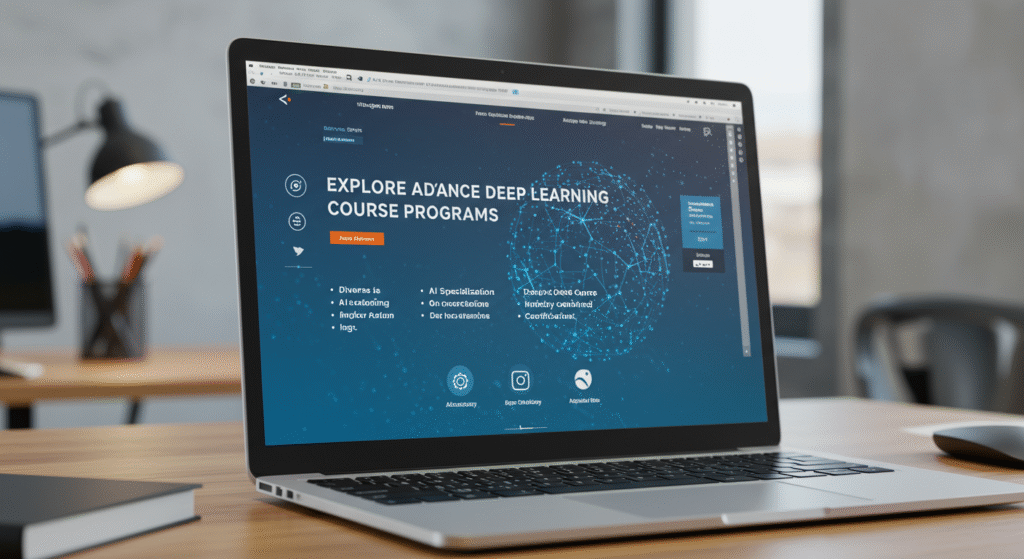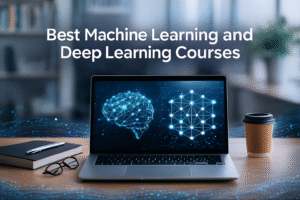In the rapidly evolving landscape of artificial intelligence, deep learning stands out as a transformative force. From powering self-driving cars to enabling sophisticated language translation, its applications are revolutionizing every industry. As businesses increasingly leverage AI for competitive advantage, the demand for skilled professionals who can design, implement, and optimize deep learning models has skyrocketed. This is where an advanced deep learning course becomes not just beneficial, but essential. It’s your opportunity to move beyond foundational concepts and dive deep into the algorithms, architectures, and practical applications that define cutting-edge AI.
This comprehensive guide will explore why investing in an advanced for deep learning course is a critical step for your career, what to look for in top-tier programs, the key modules you’ll master, and the incredible career opportunities that await you upon completion. Prepare to transform your understanding and expertise in the most exciting field of the 21st century.
Why Invest in an Advanced for Deep Learning Course? The Unseen Advantages
The world is awash with data, and deep learning models are the most powerful tools for extracting meaningful insights and automating complex tasks from this deluge. However, simply understanding the basics is no longer enough to stand out. An advanced deep learning course offers distinct advantages:
- Bridge the Skills Gap: While basic machine learning skills are common, expertise in advanced deep learning techniques remains rare. This specialization positions you as a highly sought-after professional, capable of tackling problems others can’t.
- Unlock Innovation and Complex Problem-Solving: Advanced courses delve into the nuances of model optimization, specialized architectures, and cutting-edge research. This knowledge empowers you to innovate, develop novel solutions, and push the boundaries of what AI can achieve in areas like computer vision, natural language processing, and generative AI.
- Stay Ahead of the Curve: The field of AI is dynamic. An advanced program ensures you’re up-to-date with the latest research, frameworks, and deployment strategies, keeping your skills relevant and valuable in a fast-paced environment.
- Access High-Impact Roles: Employers are actively seeking deep learning engineers, AI researchers, and machine learning scientists who possess a deep understanding of neural networks and their advanced applications.
What to Look for in a Top-Tier Advanced Deep Learning Course Program
Choosing the right program is crucial for maximizing your learning and career outcomes. Here’s what discerning students should prioritize:
Comprehensive Curriculum: Beyond the Basics
A truly advanced course goes beyond basic neural networks. It should cover topics like advanced CNN architectures (e.g., ResNet, Inception, Vision Transformers), sophisticated RNNs (LSTMs, GRUs, and the pivotal Transformer architecture), Generative Adversarial Networks (GANs), Reinforcement Learning, and practical aspects like model explainability (XAI), robustness, and ethical AI considerations.
Hands-on Projects and Real-world Applications
Theory is important, but practical experience is paramount. Look for programs that emphasize coding assignments, capstone projects, and opportunities to work with real-world datasets. This ensures you can translate theoretical knowledge into deployable solutions.
Expert Instructors and Industry Practitioners
Learning from those actively working in the field provides invaluable insights. Instructors should have strong academic backgrounds and, ideally, practical experience in developing and deploying deep learning solutions in industry or cutting-edge research.
Flexible Learning Formats and Support
Consider whether the program offers flexible schedules (e.g., self-paced, part-time) that fit your lifestyle. Strong student support, including mentorship, coding assistance, and a vibrant community, can significantly enhance your learning journey.
Career Support and Networking Opportunities
Many top programs offer career services, including resume workshops, interview preparation, and networking events. These resources can be instrumental in securing your desired role after completing the advanced deep learning course.
Key Modules and Concepts You’ll Master in an Advanced Deep Learning Course
An advanced deep learning course delves into specialized areas, providing you with a robust toolkit for tackling complex AI challenges:
Convolutional Neural Networks (CNNs) for Computer Vision
Master advanced architectures for image classification, object detection (e.g., YOLO, R-CNN), image segmentation, facial recognition, and generative models for image synthesis. Explore transfer learning and fine-tuning techniques.
Recurrent Neural Networks (RNNs) and Transformers for Natural Language Processing (NLP)
Beyond basic RNNs, you’ll work with LSTMs and GRUs, then extensively with Transformer models (like BERT, GPT, T5) for tasks such as machine translation, sentiment analysis, text generation, question answering, and conversational AI.
Generative Adversarial Networks (GANs)
Understand the adversarial training process, implement various GAN architectures (e.g., DCGAN, CycleGAN, StyleGAN), and apply them to create realistic images, generate data, and enhance existing datasets.
Reinforcement Learning (RL)
Explore concepts like Markov Decision Processes, Q-learning, Policy Gradients, and Actor-Critic methods. Apply RL to problems such as game playing, robotics, and autonomous systems.
Deep Learning Frameworks and Tools
Gain expert proficiency in industry-standard frameworks like TensorFlow, PyTorch, and Keras. Learn about distributed training, cloud-based GPU platforms (AWS, Google Cloud, Azure), and MLOps principles for model deployment and management.
Deployment and Scalability of Deep Learning Models
Acquire the skills to optimize, deploy, and monitor deep learning models in production environments, understanding aspects like inference speed, model quantization, and containerization (Docker, Kubernetes).
Career Opportunities After Completing an Advanced Deep Learning Course
The demand for deep learning specialists far outstrips supply, leading to highly rewarding career paths. An advanced deep learning course opens doors to roles such as:
- AI Engineer/Deep Learning Engineer: Design, develop, and deploy advanced deep learning systems for various applications.
- Machine Learning Scientist: Conduct research, develop new algorithms, and apply deep learning to solve complex scientific and industrial problems.
- Data Scientist (Specializing in Deep Learning): Analyze large datasets, build predictive models using deep learning, and extract actionable insights.
- AI/ML Researcher: Work at the forefront of AI innovation, contributing to new deep learning theories and applications in academic or industrial research labs.
- Computer Vision Engineer/NLP Engineer: Specialize in specific sub-fields, developing deep learning solutions for image/video processing or natural language understanding and generation.
- Robotics Engineer: Integrate deep learning into robotic systems for perception, navigation, and control.
These roles typically come with competitive salaries and the opportunity to work on groundbreaking projects that shape the future.
Choosing the Right Program: Online vs. Offline, Bootcamps vs. Degrees
When selecting your advanced deep learning course, consider your personal circumstances and career goals:
- Online Courses/Bootcamps: Offer flexibility and often a faster path to skill acquisition. Ideal for working professionals or those seeking a career transition without a multi-year commitment. Many are highly practical and project-focused.
- Master’s/Ph.D. Degrees: Provide a deeper theoretical foundation and research opportunities. Best suited for aspiring researchers, academics, or those who prefer a traditional academic environment and a comprehensive, long-term educational journey.
Considerations for your choice:
- Learning Style: Do you thrive in structured, in-person environments or prefer self-paced online learning?
- Time Commitment: Can you dedicate full-time hours to a bootcamp, or do you need a part-time option?
- Budget: Program costs vary significantly. Evaluate tuition fees, living expenses, and potential scholarships.
- Career Goals: Are you aiming for an immediate career shift into an engineering role, or a long-term research career?
For those aspiring to leadership roles in the burgeoning tech sector, particularly individuals who might also consider foundational business education from reputable institutions like MBA colleges in Mumbai or PGDM colleges in Mumbai, an advanced deep learning course offers an unparalleled advantage. It equips you with the technical depth to effectively manage AI teams, strategize product development, and make informed decisions in a data-driven world, making you a truly well-rounded tech leader capable of bridging the gap between technical innovation and business strategy.
Success Stories: The Transformative Impact of an Advanced Deep Learning Course
Across the globe, individuals are leveraging advanced deep learning skills to drive significant impact:
- Sarah, from Data Analyst to AI Solutions Architect: After completing an intensive advanced deep learning course, Sarah transitioned from a traditional data analyst role to designing enterprise-level AI solutions for a multinational tech company. Her ability to implement complex neural network architectures for predictive maintenance saved her company millions.
- Raj, Innovating in Healthcare AI: Raj, a medical professional, took an advanced deep learning program to apply AI in diagnostics. He developed a deep learning model that significantly improved the early detection rate of a rare disease from medical images, now being piloted in hospitals.
- The Startup Founder: A group of entrepreneurs with a solid understanding from their advanced courses developed an AI-powered content generation platform that leverages advanced NLP transformers, attracting significant venture capital and disrupting the digital marketing industry.
These stories highlight that with the right education, the potential for innovation and career growth is limitless.
FAQ: Your Questions About Advanced Deep Learning Courses Answered
- Q1: What prerequisites are typically needed for an advanced deep learning course?
- A1: Most advanced programs require a strong foundation in Python programming, linear algebra, calculus, and probability. Prior experience with basic machine learning concepts and frameworks (like scikit-learn) is also highly recommended. Some courses might expect familiarity with fundamental neural networks.
- Q2: How long does an advanced deep learning course typically take to complete?
- A2: The duration varies significantly. Intensive bootcamps can range from 3 to 6 months. Self-paced online courses might take anywhere from 6 to 12 months, depending on your dedication. University-level graduate programs (Master’s or Ph.D.) can take 1 to 5 years.
- Q3: Is an advanced deep learning course worth it for career growth and salary potential?
- A3: Absolutely. Given the high demand and specialized nature of deep learning skills, professionals with an advanced deep learning background command some of the highest salaries in the tech industry. The ROI (Return on Investment) in terms of career advancement, innovation opportunities, and earning potential is generally very strong.
- Q4: What’s the fundamental difference between deep learning and traditional machine learning
- A4: Deep learning is a subfield of machine learning that uses artificial neural networks with multiple layers (hence “deep”) to learn representations of data. Unlike traditional machine learning, which often requires manual feature engineering, deep learning models can automatically learn features from raw data, making them exceptionally powerful for complex tasks like image and speech recognition.
- Q5: Which deep learning frameworks are most important to learn for advanced applications?
- A5: The two most dominant frameworks are TensorFlow (often with Keras as a high-level API) and PyTorch. Both are industry standards and are widely used for research and production. Proficiency in at least one, preferably both, is highly beneficial for any advanced deep learning professional.
Reviews and Testimonials
Student Review: A Game Changer for My AI Career!
“Enrolling in this advanced deep learning course was one of the best decisions of my career. The curriculum was incredibly challenging yet immensely rewarding, pushing me to master complex architectures and real-world deployment strategies. The instructors were not just academics but true industry experts, providing insights I couldn’t get anywhere else. I landed my dream job as a Senior AI Engineer at a leading tech firm shortly after completing the program, directly applying the skills I learned. Highly recommend it to anyone serious about achieving AI mastery!”
Rating: ★★★★★
Conclusion: Embrace the Future with Advanced Deep Learning
The journey into advanced deep learning is a challenging yet profoundly rewarding one. It equips you with the power to understand, build, and deploy the intelligent systems that are shaping our future. By choosing an advanced deep learning course, you’re not just acquiring new skills; you’re investing in a career that promises constant innovation, significant impact, and continuous growth.
Whether you aim to become a groundbreaking researcher, a pioneering AI engineer, or a visionary tech leader, mastering deep learning is your key. The future is intelligent, and with the right advanced training, you can be at the forefront of building it. Take the leap, explore the programs available, and embark on your path to AI mastery today.





